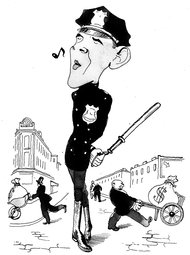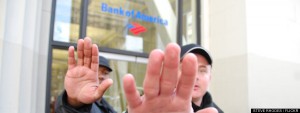
October 23, 2010
What Happened to Change We Can Believe In?
By FRANK RICH
Phi Beta Iota: Extracts are provided. This is an important document that confirms the total abdication by Congress and the Executive of their Constitutional duties with respect to the public interest. The USA is owned and operated by Wall Street for its benefit, and We the People have been completely disenfranchised at the same time that the Commonwealth has been looted.
EXTRACT:
No matter how much Obama talks about his “tough” new financial regulatory reforms or offers rote condemnations of Wall Street greed, few believe there’s been real change. That’s not just because so many have lost their jobs, their savings and their homes. It’s also because so many know that the loftiest perpetrators of this national devastation got get-out-of-jail-free cards, that too-big-to-fail banks have grown bigger and that the rich are still the only Americans getting richer.
 This intractable status quo is being rubbed in our faces daily during the pre-election sprint by revelations of the latest banking industry outrage, its disregard for the rule of law as it cut every corner to process an avalanche of foreclosures. Clearly, these financial institutions have learned nothing in the few years since their contempt for fiscal and legal niceties led them to peddle these predatory mortgages (and the reckless financial “products” concocted from them) in the first place. And why should they have learned anything? They’ve often been rewarded, not punished, for bad behavior.
This intractable status quo is being rubbed in our faces daily during the pre-election sprint by revelations of the latest banking industry outrage, its disregard for the rule of law as it cut every corner to process an avalanche of foreclosures. Clearly, these financial institutions have learned nothing in the few years since their contempt for fiscal and legal niceties led them to peddle these predatory mortgages (and the reckless financial “products” concocted from them) in the first place. And why should they have learned anything? They’ve often been rewarded, not punished, for bad behavior.
EXTRACT:
The much acclaimed new documentary about the global economic meltdown, “Inside Job,” has it right. As its narrator, Matt Damon, intones, our country has been robbed by insiders who “destroyed their own companies and plunged the world into crisis” — and then “walked away from the wreckage with their fortunes intact.” These insiders include Dick Fuld and four other executives at Lehman Brothers who “got to keep all the money” (more than $1 billion) after Lehman went bankrupt. And of course Robert Rubin, who encouraged Citigroup to step up its investment in high-risk bets like Countrywide’s mortgage-backed securities. Rubin, now back as a rainmaker on Wall Street, collected more than $115million in compensationduring roughly the same period Mozilo “earned” his half a billion. Citi, which required a $45 billiontaxpayers’ bailout, recently secured its own slap-on-the-wrist S.E.C. settlement — at $75 million, less than Rubin’s earnings and less than its 2003 penalty ($101 million) for its role in hiding Enron profits.
It should pain the White House that its departing economic guru, the Rubin protégé Lawrence Summers, is an even bigger heavy in “Inside Job” than in the hit movie of election season, “The Social Network.” Summers — like the former Goldman Sachs chief executive and Bush Treasury secretary Hank Paulson — is portrayed as just the latest in a procession of policy makers who keep rotating in and out of government and the financial industry, almost always to that industry’s advantage. As the star economist Nouriel Roubini tells the filmmaker, Charles Ferguson, the financial sector on Wall Street has “step by step captured the political system” on “the Democratic and the Republican side” alike. But it would be wrong to single out Summers or any individual official for the Obama administration’s image of being lax in pursuing finance’s bad actors. This tone is set at the top.
Asked in “Inside Job” why there’s been no systematic investigation of the 2008 crash, Roubini answers: “Because then you’d find the culprits.” With the aid of the “Manhattan Madam” (and current stunt New York gubernatorial candidate) Kristin Davis, the film also asks why federal prosecutors who were “perfectly happy to use Eliot Spitzer’s personal vices to force him to resign in 2008” have not used rampant sex-and-drug trade on Wall Street as a tool for flipping witnesses to pursue the culprits behind the financial crimes that devastated the nation.
EXTRACT:
Even as the G.O.P. benefits from unlimited corporate campaign money, it’s pulling off the remarkable feat of persuading a large swath of anxious voters that it will lead a populist charge against the rulers of our economic pyramid — the banks, energy companies, insurance giants and other special interests underwriting its own candidates. Should those forces prevail, an America that still hasn’t remotely recovered from the worst hard times in 70 years will end up handing over even more power to those who greased the skids.
We can blame much of this turn of events on the deep pockets of oil billionaires like the Koch brothers and on the Supreme Court’s Citizens United decision, which freed corporations to try to buy any election they choose. But the Obama White House is hardly innocent. Its failure to hold the bust’s malefactors accountable has helped turn what should have been a clear-cut choice on Nov. 2 into a blurry contest between the party of big corporations and the party of business as usual.
Phi Beta Iota: The Tea Party is an unwitting circus act fully funded and controlled by the New York mandarins. The lack of responsible alternatives on the left or the right, combined with the naivete of the public in thinking that the Tea Party is anything other than a side show, could lead–we never thought we would say this–to a new Administration and Congress even more ineffective than the last two. The further American governance moves from the truth, the deeper our grave.






